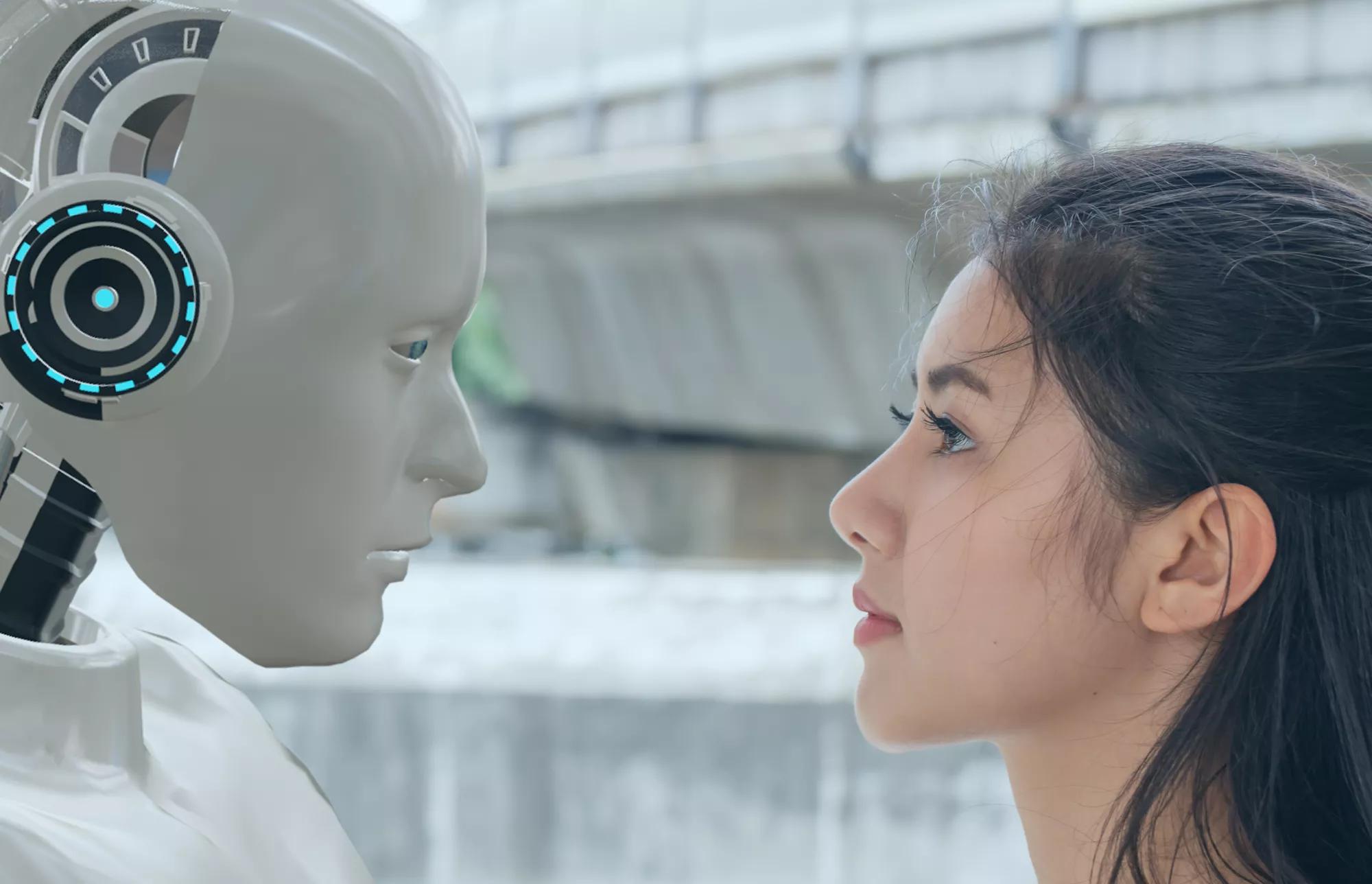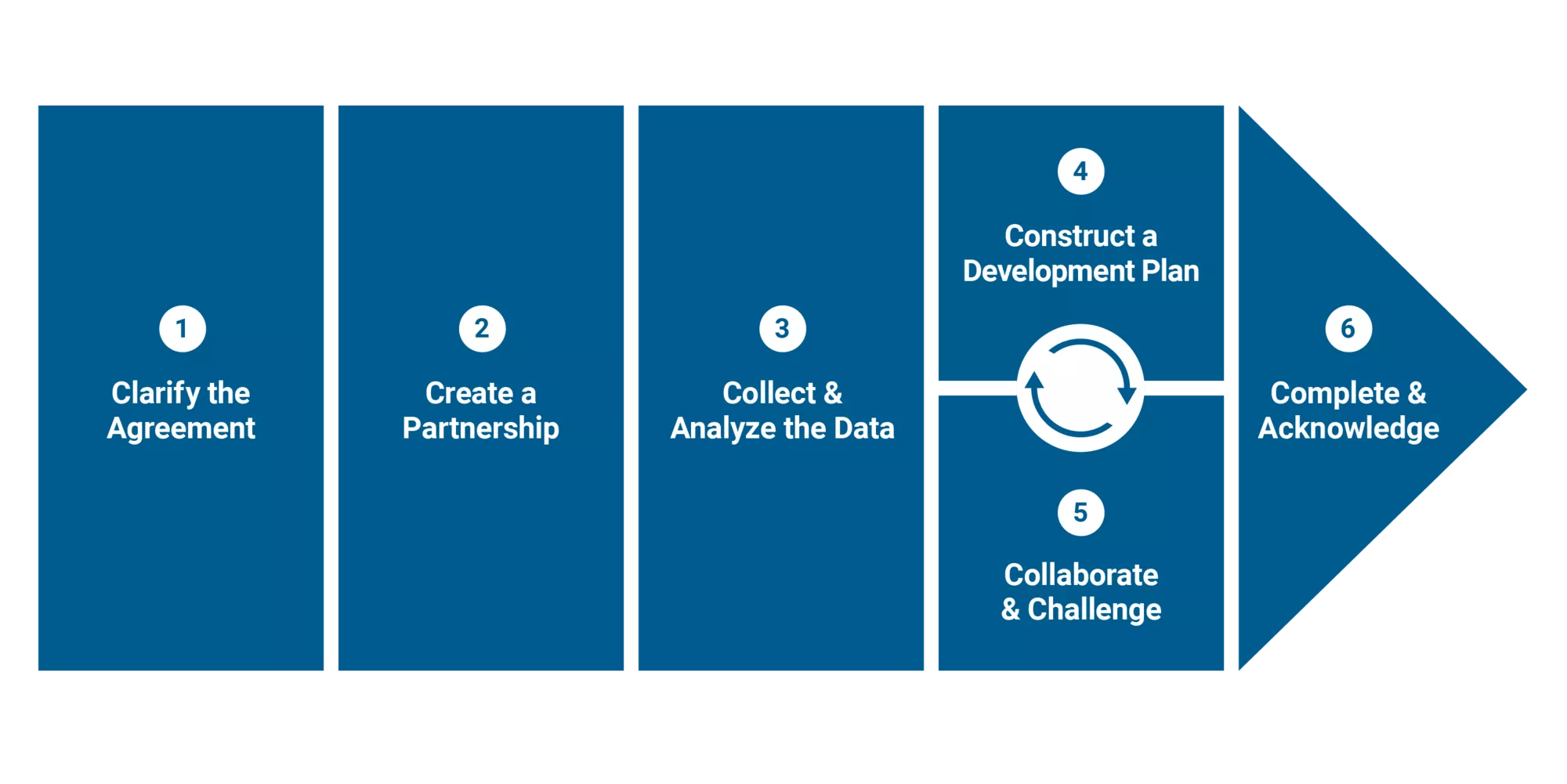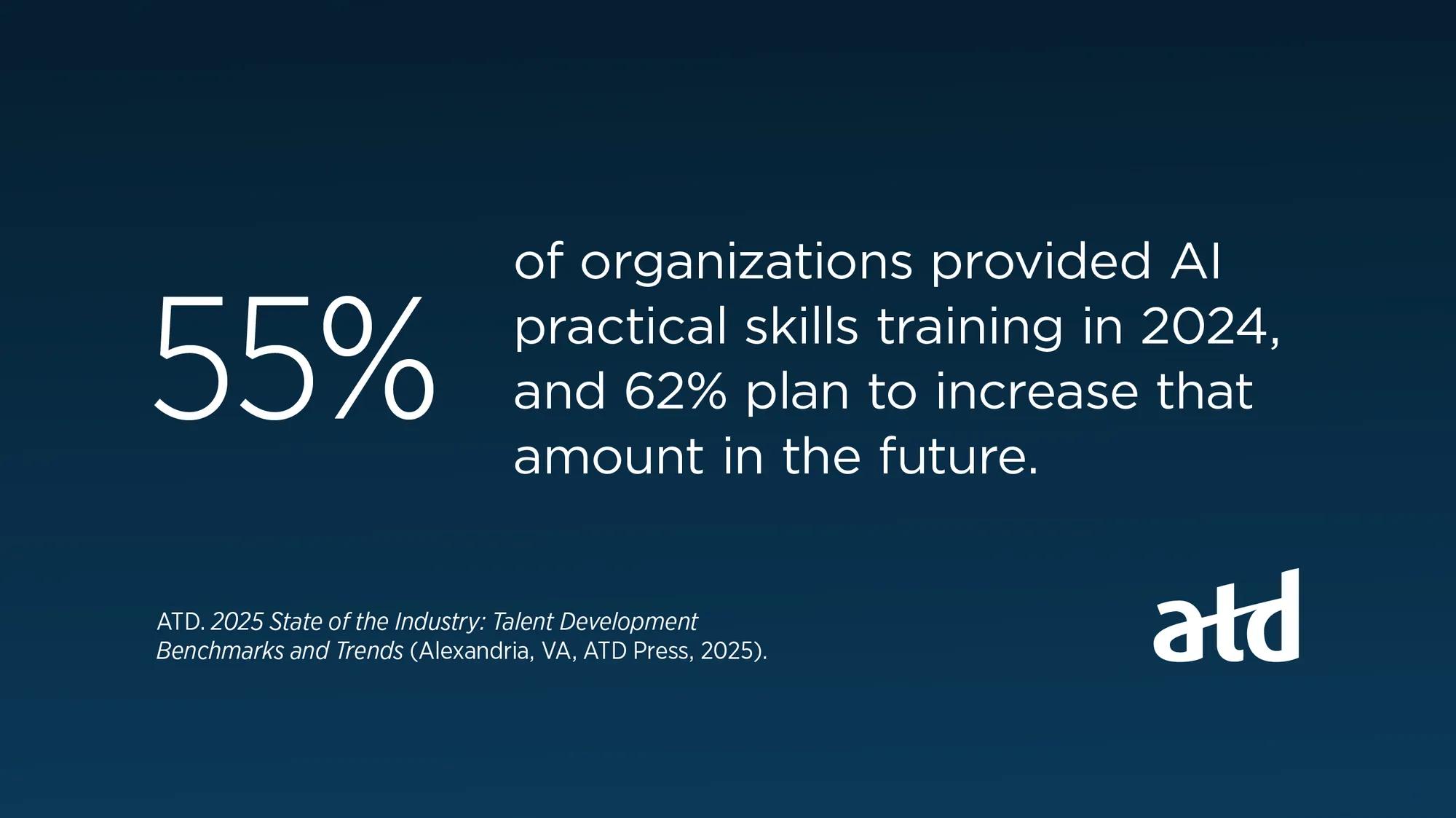ATD Blog
Human Coaching vs. AI in Coaching
Both human coaches and AI have unique roles to play in supporting individuals’ development journeys.
Tue May 20 2025

Is there a place for artificial intelligence (AI) in coaching? Is there a place for coaching in a world increasingly committed to using artificial intelligence to solve all of its problems? These are challenging questions. And just as in any coaching situation, it’s the tough questions that show us the path forward, even if the answers aren’t immediately obvious.
I’ve been part of the coaching world for so long; I remember when it was new enough to need defining or explaining any time it was mentioned. Today, most of us have at least a basic understanding of what coaching is and how it fits in. It has long been a powerful tool for personal and professional development.
AI is now the new kid on the block and has exploded in popularity through chat interfaces that serve as gateways to large language models (LLMs), allowing anyone to enter into conversation with (seemingly) every piece of knowledge in the universe.
The rise of AI introduces new possibilities in the coaching industry, sparking a debate about the role of human coaches versus AI-driven coaching tools. While both have their merits, they serve distinct purposes and offer unique advantages. Whether your goal is to improve onboarding or grow your leadership development programs, let’s explore what makes each approach effective and where they fit into the broader coaching ecosystem.
The Human Element: The Heart of Effective Coaching
I remember coaching a senior director at a technology company many years ago. As a leader within the organization, she was given the option to sign up for coaching to help her build her leadership capacity. She was an extremely talented individual with high learning agility—so much so that she could take an insight she had during the coaching and apply it, often in very meaningful and tangible ways. She was a pleasure to coach.
During one session, she shared details of an ongoing challenge she was having with one of her direct reports. This individual had joined her team six months prior, and all their interactions had felt “clunky” and “inauthentic”—at least from her perspective. And during this session, everything just spilled out of her—her confusion, frustration—the works. And boy, did this person trigger her. Call it a clash of values, work ethic, expectations—it all bubbled up during this interaction.
My focus was not on coaching her around the “problem,” but rather on her relationship to it. What was really causing her angst? We ended up spending a significant amount of time digging into her belief systems, mindset, approach, and fears. And together, we unlocked insights that helped her let go of some of her angst and adopt a different approach to navigating the situation at hand.
It always makes one’s heart happy to help someone, even in some small way, to have an insight that serves them. Such is the power of coaching. There is something about the power of feeling seen and heard by another person—the human connection. For that reason, I believe coaching will always be a human endeavor.
The essence of effective coaching lies in empathy, active listening, and the ability to hold space for individuals to explore their thoughts, feelings, and aspirations. Coaches listen not just to what is being said, but what isn’t being said. They don’t merely ask questions but ask the right question at the right time to unlock greater understanding.
ATD’s Coaching Model

Key Traits of Human Coaches
Empathetic Connection: Human coaches excel at reading between the lines, sensing unspoken concerns, and validating emotions. This empathetic approach builds trust and encourages clients to open up, facilitating deeper self-reflection and growth.
Active Listening: By truly listening to clients’ concerns and motivations, human coaches can ask insightful questions that challenge assumptions and inspire breakthroughs.
Tailored Guidance: Unlike algorithms that rely on predefined models, human coaches adapt their approach based on a nuanced understanding of individual experiences.
Compassionate Accountability: Great coaches hold clients accountable for their commitments without judgment or negativity, fostering motivation rather than guilt—not always an easy task!
Human coaching taps into emotional intelligence and interpersonal skills that machines cannot replicate. It’s not just about achieving goals—it’s about unlocking deeper levels of learning, self-discovery, and transformation.
Arguing for the human element in coaching does not mean that AI has no place in the coaching landscape. AI is amazing. I love it—and I know I haven’t even scratched the surface of what it can and will be able to do. There is no question that it can be a powerful support for both the coach and the client. But for me, AI is a reinforcement, not a replacement, of coaching.
The Role of AI in Coaching: Scale and Accessibility
AI coaching tools bring a different set of strengths to the table. Leveraging advanced algorithms and data-driven insights, AI offers immediate support, personalized recommendations, and scalable solutions that make “coaching” accessible to a broader audience.
Advantages of AI in Coaching
Personalization at Scale: AI can analyze vast amounts of data to deliver tailored resources and guidance based on individual needs, preferences, and goals.
Real-Time Feedback: AI provides instant insights during interactions—whether it’s analyzing conversation patterns or suggesting practical steps—helping users make quick adjustments.
Accessibility: Available 24/7, AI tools ensure that users can access support anytime and anywhere, without scheduling constraints.
Cost-Effectiveness: AI-powered platforms often come at a lower cost than traditional coaching methods, making them a viable option for organizations looking to scale development programs.
AI excels at structured tasks such as goal setting, progress tracking, and providing quick tips for specific scenarios (for example, preparing for a performance review). However, its mechanistic approach lacks the nuanced reasoning, responsiveness, and emotional depth that human coaches bring.
Can AI Truly Coach?
The answer depends on how we define coaching. If coaching is seen as providing guidance toward specific objectives or offering practical advice on challenges, then AI can certainly play a role. It adheres strictly to model-based frameworks like goal attainment theory, which ensures consistency in its recommendations.
However, if we view coaching as a transformative process rooted in emotional connection and holistic development, AI falls short. After all, AI can’t love you the way your coach can, no matter what "data driven insights" might say otherwise.
While AI is a game-changer, any use of this technology should be in line with AI ethics guidelines for employee training.
Limitations of AI in Coaching
AI Lacks EI: While AI can simulate empathy through programmed responses, it cannot genuinely understand or share feelings like a human coach can.
Inability to Navigate Complexity: Human coaches excel in addressing intricate situations that require higher-order reasoning across multiple domains—something AI struggles with.
Robotic Rapport: Trust is foundational in effective coaching relationships. While AI can offer recommendations, it’s a bit tricky for it to build an authentic rapport that fosters vulnerability and openness. AI lacks the natural language processing of humans, and therefore coaching conversations may come across as off in some capacity.
At Coaching.com, we are paying close attention to AI and how we can leverage it to support those we serve: coaching providers. Whether you are an individual coach or a large coaching firm, our goal is to help you deliver exceptional coaching. So, the first question for us is How do we leverage AI to help you do what you do best—coach? We see AI as an incredible tool that complements the human touch by providing supplementary support.
A Synergistic Approach
Human or AI? It’s not an either/or proposition for us. It’s a both/and solution that can really supercharge the impact coaching has in the world. To that end, we leverage AI in our platform in these ways (and we are just getting started):
Complete administrative tasks like scheduling or tracking client progress.
Provide clients with curated resources based on the coaching conversations.
Give clients access to quick advice or ongoing reinforcement between sessions.
Aggregate data from coaching to demonstrate ROI and impact.
By integrating AI into their practice, human coaches can focus more on meaningful interactions while benefiting from data-driven insights.
Conclusion: Distinct Roles in Human Development
Human coaching remains irreplaceable in its capacity to foster connection and profound personal growth. It is deeply rooted in the “human” element—listening with intention, challenging with compassion, and guiding with wisdom.
AI coaching offers scalability, immediacy, and cost-effectiveness, making it an effective tool for addressing specific needs or supplementing traditional learning methods.
Ultimately, both human coaches and AI have unique roles to play in supporting individuals’ development journeys. When used strategically together, they can unlock new growth opportunities while ensuring the irreplaceable value of human connection remains at the heart of coaching.
The Future of AI in Coaching

Implementation Tips for AI in Coaching – Recommended Resources
Applying AI in Learning & Development Certificate
Generative AI is reshaping the field of talent development. The Applying AI in Learning & Development Certificate will help you learn about the capabilities to drive transformation in your work and become an expert AI user and strategy leader.
Course Info
In this three-day program, you’ll benefit from learning from one of the field’s top AI experts, who is at the forefront of AI adoption in learning and development.
This is an immersive, hands-on course that introduces you to the many uses of generative AI for learning and development. The course draws upon key concepts from the ATD publication, Applying AI in Learning and Development, and you will receive a copy of the book along with the course materials.
This program will help you lean into your professional knowledge and guide AI to create enhanced learning solutions that are highly applicable and relevant to your work. You will also learn to integrate AI into your everyday workflows to help automate and streamline day-to-day tasks, freeing your time for deeper work. Throughout the program, you will experiment directly with AI tools and models to solve real-world L&D challenges.
Deep Understanding of AI Usage and Trends
Comprehending the principles and constructs of generative AI is key to unlocking its full potential in your work. Our field is on the precipice of massive change driven by AI. Organizations must develop a strategy to bring AI tools to employees, not to replace, but to enhance their work. L&D practitioners should stand by, ready to support their colleagues as they take on new tasks and skills. It is critical that we understand the myriad ways generative AI can enhance and expedite many common tasks in the planning, design, and analysis that inform robust learning experiences.
Practical, Real-World Application
The Applying AI in Learning and Development program will give you hands-on experience using AI tools so that you leave the course feeling empowered and confident to apply your new skills and knowledge.
In the course, you’ll practice using AI tools to:
Create structured prompts using your expertise to get the best outputs.
Accelerate performance consulting, skill mapping, and needs analysis.
Generate and refine text, images, audio, and video content for learning.
Develop storyboards, microlearning modules, video scripts, and chatbots.
Understand automated workflows, GPTs, Gems, and AI agents for L&D tasks.
At the end of this intensive learning experience, you will understand how to apply AI to your work, drive performance enablement, and create programs that benefit learners and organizations.
AI for Instructional Design Workshop
Discover the power of AI through playful practice and harness the power of generative AI to efficiently design and develop impactful learning experiences. This course will help you understand the capabilities of machine learning and teach you how to use AI-powered tools to provide real-time feedback in a training program.
Course Info
Unlock the power of AI to revolutionize your instructional design and content development process in this hands-on experience. In this interactive workshop, you'll explore the fundamentals of AI and discover its game-changing potential for instructional design. You’ll dive into real-world use cases, practice the art of communicating with AI, and leverage AI tools to streamline content creation.
You'll also learn how to harness AI for designing inclusive and equitable learning experiences while navigating the ethical considerations of responsible AI usage. The workshop culminates in a live showcase where you'll share your AI-powered work products with your peers, showcasing your new skills and innovative approaches.
Research Report: AI in Learning and Talent Development: A Closer Look Into Its Future Potential in the Workplace
In AI in Learning and Talent Development, 398 TD professionals answered questions about the potential of AI and AI in action. This study can help organizations understand the future of AI in talent development. It concludes with suggested action steps and ATD resources to help organizations learn about and use AI at their own organization. This report is ideal for those looking to incorporate AI into their leadership development strategy using data driven insights.
This article was originally published on May 20, 2025 and has since been updated with newly relevant information.
